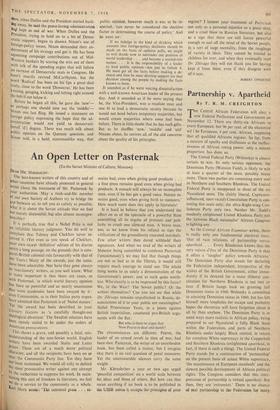An Open Letter on Pasternak
(To the Soviet Minister of Culture, Moscow)
DIAR MR. M IKHAILOV, •
The best-known writers of this country and of other countries have already protested in general terms about the treatment of Mr. Pasternak by Your authorities. May a rank-and-file member Of our own Society of Authors try to bridge the Bap between us, to tell you as calmly as possible, What it is about the Soviet attitude that we find not merely distasteful, but also almost incompre- hensible?
It is perfectly true that a Nobel Prize is not an infallible literary judgment. You do well to complain that Tolstoy and Chekhov never 're- ceived it. (Yet even as you speak of Chekhov, Your own recent 'definitive' edition of his diaries omits a long passage, on the grounds that it corn- Pares British colonial rule favourably with that of the Tsars.) Many of the awards, just the same, have been admirable. Nor have they gone always to 'reactionary' writers, as you well know. What is more important is that there are cases, as with Pasternak, in which world literary opinion has been so powerful and so nearly unanimous that even academies have been swayed by it : even Communists, as in their Italian party organ, have admitted that Pasternak is of 'Nobel stature.' Yet the award has been described in your Literary Gazette as 'a carefully thought-out ideological diversion.' The Swedish selectors have been openly stated to be under the orders of American provocateurs. This shows a grave, and possibly a fatal, mis- understanding of the non-Soviet world. English writers have been awarded Stalin and Lenin Prizes. These are of a much more political character, and all the recipients have been on or near the Communist Party line. Yet they have not been victimised. We would all rally to defend the most' provocative writer against any attempt by the authorities to suppress his work. In main- taining this sort of freedom in literature, we feel We do a service to the community as a whole. Karl Marx wrote: 'The censored press . . . re- mains bad, even when giving good products . . . a free press remains good even when giving bad products. A eunuch will always be an incomplete man, even if he has got a good voice. Nature re- mains good, even when giving birth to monsters.' How much more does this apply to literature!
It is hard to believe that you understand the effect on us of the spectacle of a powerful State assembling all its orgalis of pressure and pub- licity to crush one silenced man. A brave man, too, as we know from his refusal to sign the vilification of the groundlessly executed marshals. Few other writers then dared withhold their signatures. And when we read of the writers of Moscow being assembled to condemn Pasternak (`unanimously'), we may feel that though things are not as -bad as in the Thirtes, it would still require much courage to stand out. The whole thing seems to us solely a demonstration of the Government's power, and as such quite worth- less. Who exactly is to be impressed by this farce? We, in the West? The Soviet public? Or the writers themselves? Can you not see that while Dr. Zhivago remains unpublished in Russia, de- nunciations of it to your public are meaningless? Nobel Prizewinner Yeats, in a poem against British imperialism, countered pro-British argu- ments with the flat : But who is there to argue that
Now Pearsc is deaf and dumb?
The circumstances are different. Pearse, the leader of an armed revolt in time of war, had been shot. Pasternak, the writer of an unorthodox book, has been called a traitor, but I imagine that there is no real question of penal measures. Yet the unanswerable silences carry the same weight.
Mr. Khrushchev a year or two ago urged `peaceful competition' on a world scale between his ideas and those of others. But how can that mean anything if no book is to be published in the USSR unless it accepts the principles of your regime? I lament your treatment of Pasternak not only as a personal injustice to a great man, and a cruel blow to Russian literature, but also as a sign that there are still forces powerful enough to seal off the mind of the Soviet people, in a sort of siege mentality, from the roughage of variety in ideas. They cannot be treated as children for ever, and when they eventually read Dr. Zhivago they will not thank you for having kept it from them, even if they disagree with all it says.
ROBERT CONQUEST


































 Previous page
Previous page